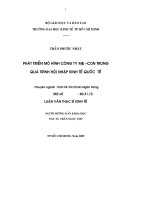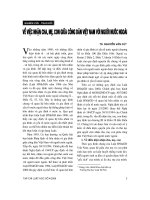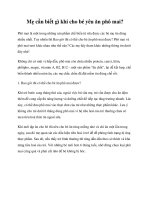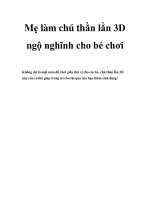Me! Me! Me! Which Inner Self is Running Your Life? by Astra Niedra pdf
Bạn đang xem bản rút gọn của tài liệu. Xem và tải ngay bản đầy đủ của tài liệu tại đây (557.88 KB, 18 trang )
Me! Me! Me! Which Inner Self is Running Your Life?
by Astra Niedra
Smashwords Edition
Copyright 2012 Astra Niedra
Smashwords Edition, License Notes
Please enjoy this free ebook, and feel welcome to share it with your friends. This
ebook may be reproduced, copied and distributed for non-commercial purposes,
provided it remains in its complete original form and includes the author's name and
contact details at the end. If you enjoyed this book, please return to Smashwords.com
to discover other works by this author.
Me! Me! Me! Which Inner Self is Running Your Life?
by Astra Niedra
Would you like to understand yourself better, including why you make the decisions
you do and have the feelings you have? Are you conflicted about some aspects of your
life? Would you like to have greater choice in how you behave and feel, and be able
to make better decisions? You'll find some answers in the article below, which
introduces leading-edge developments in psychology and consciousness studies
which reveal that there is far more to the human psyche and personal identity than
you might have presumed.
Imagine this scene:
You are out shopping one day and you notice an amazing dress (or other outfit) in a
window display. You are really drawn to the dress so you step inside the store and the
sales assistant suggests you try it on. The dress fits perfectly and the sales assistant
says it looks amazing on you, and you start to feel that you just have to have it. The
price of the dress is almost one month's rent but you know you can put it on your
credit card — so, making thousands of justifications about doing that, you do. When
you arrive home you are still excited about the dress and you go to sleep feeling
somehow revitalized.
The next morning you feel slightly uneasy. It's Monday, so you get ready for work
and as you take your work clothes from the wardrobe you see the dress. You take it
out and hold it up against you, examining yourself in the mirror. The feeling you have
is "Oh dear, what have I done?" Now the dress looks ridiculous. It is definitely not
suitable for work and you would never wear it out. It's just not you — you don't even
have shoes that go with it. Then you remember the price. Ouch!
Most of us have had this type of experience, where we buy something on a whim, and
later we either beat ourselves up about it or just try to forget it, occasionally taking the
item out of the wardrobe but always putting it back in favour of something else. We
put this down to being 'one of those bad decisions' or an impulse buy we had not
thought through.
But leading-edge psychological research shows that the reason for inner conflict and
situations like the above shopping example is that our sense of identity is not quite as
simple as we have assumed. When you say 'I' or 'me' you are in fact referring to a
different part of your personality at different times. Each of us has a number of sub-
personalities or selves, which are discrete units that together make up our whole
personality. Different selves assume our identity throughout the day, each one taking
care of particular aspects of our lives.
For example, when you are at work your organised and efficient self might be
dominant; when you are having a coffee or drink with friends a more carefree and/or
social self might emerge; when you pick up your children from school a nurturing
parental self might emerge; when you are on holidays your lazy self has its turn; and
when you are with your partner you probably access your sensual and sexual selves.
Some of us operate from only one or two selves all the time — where you might find,
for example, that you are always organised and efficient and planning for the future,
even when you are trying to relax on holidays, and you find that you can never really
rest and stay in the present. Or you might always operate from a caretaking self who
feels it has to look after others and you find it impossible to ensure your own needs
and desires are taken care of. Others flip from self to self, one minute wanting to go in
one direction and the next minute feeling certain of an different option.
We all have our 'favourite' selves, which are those parts of ourselves we use most of
the time and by which other people recognise us. These are called our primary selves.
But we also have other parts of our personality which we hide or suppress. These are
our disowned selves, often referred to as our 'shadow'.
All the selves within us have their own feelings, thoughts, opinions and needs — and
they do not always agree. That is why you might feel conflicted about your job, for
instance. The part of you who likes order and predictability probably loves it that you
work nine-to-five and do the same thing every day, for the same organisation and with
the same people. This feels safe and comfortable for that part of you. In contrast, the
part of you who craves adventure, excitement and change feels frustrated in that same
job. The experience you get from this is that most of the time you might be content in
your job (if your order-loving self is your primary, dominant self) but at other times
you feel you hate it and you fantasize about a more adventurous lifestyle — it
depends on which self's thoughts and feelings are dominant in you at the time.
This way of thinking about the personality was developed in the early 1970s by two
psychologists from the United States, Drs Hal and Sidra Stone, and their work has
been evolving ever since. It has also influenced the development of many other
schools of thought and other personal growth teachers. Their theory is called the
Psychology of Selves and is also known as Voice Dialogue, which is the technique
they developed to dialogue with selves, enabling you to become aware of who in you
is calling the shots, and what the opposites might be.
Voice Dialogue is a simple process, which you can learn to do with a partner or
friend, where one person interviews the selves in another person with the aim of
simply discovering and validating who they are, without trying to change them in any
way. When you decide to speak with, for example, your adventurous self, you move
to one side of your 'centre', which is the place you start the process from and is where
you return at the end, and then the adventurous self is able to communicate its
thoughts and feelings without other parts of your psyche getting in the way. The
person interviewing the self stays in the same place for the duration of the dialogue
and asks the adventurous self about how it feels, what it likes to do, whether it gets
expression in the person's life, and so on. When the conversation is over, the person
who has just been expressing their adventurous self moves back to their original
place. In this place you would feel different from when you first sat down to do the
process. You would have a sense of having more 'breathing space', greater awareness
and clarity, and the ability to tap into an opposite self, such as a self who likes
predictability and doesn't like trying new things, and doesn't at all agree with the
adventurous self. When you listen to and experience both selves and come back to the
centre, you now have a new space in your consciousness from where you can take
into consideration both perspectives.
The Stones' call this space the Aware Ego. An Aware Ego emerges when a person is
able to unhook from the parts of themselves that they previously identified with as
themselves. It is having an awareness of your selves as distinct from you but still a
vital part of who you are. An Aware Ego is not about being in a state of awareness or
with being 'the witness' as is the aim with meditation, nor is it about 'letting go' of the
ego (which is really your primary self); but it is about embracing the totality of who
you are. By unhooking from your dominant self who has specific rules and ideas
about how you ought to be in the world and who has been running your life, you are
now able to listen to and accept opposites and open up a whole new set of possibilities
for yourself.
For a practical example of how this might work for you, think back to the example of
shopping for clothes. Can you see how the different parts of you might like different
clothes? Often when you do something that is either exciting or relaxing (or even
frightening), such as shopping, you let go a little of the part of your personality who is
usually in charge — your primary self. This leaves an opening for other parts of you
to emerge, in the example I've given, a part who likes extravagant and flamboyant
clothes. (When people drink or take drugs the primary self also loses its hold and so
they are able to access selves they can't normally access when they are sober, which is
why someone who can't relax will have a drink and then a self who can relax comes
out, or why someone who is shy will have a drink and let out their more confident and
outgoing self, or why someone very proper will behave outrageously after a few
drinks.)
So if you usually buy clothes you can wear to work — which for many people who
work in a corporate environment, for example, means fairly low-key and conservative
items that are easy to mix and match, when this other part of you emerges and sees
something it likes and want to have, you feel that you absolutely love this item and
have to have it. However, such feelings are those of the extravagant self or some other
opposite in you. The next day when you are getting dressed for work, your primary
self would be the one getting dressed, because your primary self is who you are most
of the time. That part of you sees what you have bought and says 'I can't wear this!'
When you start to become aware of your different selves and can experience their
different perspectives, you can make more balanced decisions, taking into account the
wishes of the selves involved. So when you are shopping you would feel the
excitement of your extravagant self when it sees something it wants to buy, but at the
same time you would feel your more conservative self tell you that you need
something to wear to work. It then becomes your responsibility to make the decision
— what you decide will take into consideration the views of both conflicting selves,
but there is no right or wrong decision. You might decide to buy one outfit for each
part or buy only the extravagant clothes while being aware that you are disappointing
the more conservative part of yourself, or vice versa.
Making decisions with the awareness of opposite perspectives instead of blindly
going along with the wishes of one side of you stops any self-criticism later from the
part of you who missed out on what it wanted. You now have a real choice rather
than having just one part of you making your decisions at any given time.
Examples of selves
There are many selves in each of us, even though we usually identify with only a few.
There are responsible selves and irresponsible selves, adult selves and child selves,
rational selves and creative selves, spiritual selves and instinctual selves. Following is
a list and brief description of some selves you might be familiar with, either in
yourself or in others. I've grouped them in pairs of opposites. This is by no means an
exhaustive list or even necessarily how you might name each self, but it gives you an
idea of the different types of selves in each of us. You might like to consider which of
these selves you identify with the most, and which ones you might have disowned or
are simply not conscious of.
Rule Maker
Someone identified with rules will follow the rules of their family and social group.
They will choose a lifestyle that fits in with family and cultural expectations and they
will do well in that field. Identifying with this sub-personality leads to acceptance by
your family and the wider community to which you belong.
Rebel
The rebel breaks the rules! This personality does the opposite of what is expected by
their family and culture. Rebels find their own way of doing things and often rock the
boat. The rebel likes to think of itself as having no rules but it does have one golden
rule which is to break all the rules.
Cautious Observer
The observing and cautious self likes to suss out a situation before it takes action. It
needs to understand how something works before it participates. It stands back and
observes and can be seen as shy but really just likes to know what is going on.
Spontaneous
The spontaneous self jumps in and participates and then thinks about what it has done
later, if at all. It engages with people instantly and takes action quickly. It does not
plan or consider consequences of its actions. It is a very ‘enjoy the moment’ self.
Pleaser
The pleaser is a great personality for others to have around because it makes other
people feel so good. It is considerate, kind and helpful. However, it does not get its
own needs met and can feel drained from all the energy it gives to others.
Selfish
The selfish self considers only itself. It makes sure its needs are met — it always
comes first. It does not care about other people’s needs and has no qualms about
stepping over others for its own interests. The selfish self rarely becomes tired or sick,
and it sets great boundaries.
Pusher
This is the force which propels you to action. Someone with a strong pusher will get
many things done. The pusher is constantly on the go and is always thinking about
what needs doing next. Nothing is ever finished — there is always more to do on its
list. It leads to high achievement and high energy but unchecked leaves a person
stressed, tense and unable to relax. Pushers are unable to enjoy their achievements
because they never stop long enough to do so.
Being
The being self is still. It is focused in the moment. There is nothing to do and nowhere
to go. This is a restful place where you can recharge your batteries. Time seems to
stand still and you feel relaxed and alert if you are a being personality. This is a nice
balance to the pusher but if you are always being you are not doing and therefore will
not get much done.
Perfectionist
The perfectionist makes sure everything is perfect. Perfectionists look over everything
they do countless times and they keep improving. They can stand in front of the
mirror for hours doing their makeup and they can get stuck on one task at work,
redoing and revising until everything is just right. Perfectionists find it difficult to
finish things and can take so much time doing one small thing.
Slob
The slob does not have any standards. Everything is fine as it is. Mistakes are not a
problem, mess is not noticed. You would not want this self performing brain surgery
but it is easy-going and relaxed compared to the uptightness of an absolute
perfectionist.
Personal
If you are personal then you connect with people warmly and openly. You like being
in close contact with people and you share your feelings and thoughts easily. People
feel like you are present with them. This can feel good but it also leaves you with no
boundaries and can drain your energy.
Impersonal
If you are impersonal you are cool and a bit distant. You connect with people but on a
more mental level. You can discuss ideas and share thoughts but not feelings.
Impersonality gives you objectivity and allows you to maintain you own space. A
great self to use in business and when you do not want to take on other people’s
‘stuff'.
Critic
We all have an inner critic and unfortunately most of us become victim to this self.
The critic points out our weaknesses, flaws, mistakes, and generally anything less
than perfect about us — yet perfection, even by the critic's own admission, is
something we can never achieve. Together with the perfectionist and pusher, the critic
keeps us trying harder and harder. Then, directed outwards, this self becomes a judge.
The judge looks at others and does to them what the critic does internally to us.
Inner Teacher
This part of us has wisdom, it is supportive and it is on our side. It sees the lessons we
can learn from our lives and reveals these to us. Being identified with this self, you
would be compassionate towards yourself and others. You might be seen as a wise
being who is full of acceptance and good advice.
Spiritual
The spiritual self is concerned with matters of spirit. It may have experienced
extraordinary spiritual energies, or it may have a strong desire for spiritual experience
and so participates in particular practices in order to lead to such experiences, or it
may express itself in a more traditional religious way, following the rules of an
organised religion. Either way, its focus is on a god or ultimate energy of some kind,
and it often does not value very highly everyday matters of life on earth.
Earthly
The earthly self is interested in the here and now. It is concerned with the material
world, but is not necessarily materialistic, and usually identifies with being an atheist.
Philosophically it is more of an empiricist, valuing direct experience through the
physical senses. The earthly self is also concerned with very earthly things like the
environment, sustaining life, the practicalities of life such as food, shelter and family
life.
Feeling
The feeling self feels. It picks up what other people feel, it is affected by events and
people, and it expresses emotions easily. The feeling self is more connected to the
body than the mind — feelings are often felt throughout your whole body. The
thoughts of the feeling self are mainly about feelings and they can be muddled by the
feelings that accompany them.
Mind
If you are identified with the mind, you think. The mind analyses, woks out solutions,
thinks abstractly. The mind is impersonal and objective. It is not concerned with the
experience of feelings and relating to others, but it can analyse feelings and
relationships. We all have a mind but some of us are more mental than others — in
more ways than one!
Outgoing
The outgoing self is focused outside itself. It interacts with others easily and talks out
its ideas with others rather than spending time looking inward. It is friendly and very
comfortable with other people. It is confident and sure of itself. It has a strong,
resilient nature.
Shy
The shy self is not confident with other people or in groups. It is quiet and soft and
often sweet. They shy self is introverted and feels as though it is hiding, or would like
to hide if it feels too exposed or at the centre of attention. It is often perceived more
negatively than the outgoing self in our culture but it has its strengths such as
sweetness and sensitivity.
(Images courtesy of Yen magazine)
Exercise to help you discover your primary and disowned selves:
1. Consider who in your life you really judge. Write down what it is you judge about
this person. This quality, or qualities, are what you disown. These are qualities you
have somewhere along the line needed to suppress, but now you can develop a
relationship with them, integrating them into your own psyche so you can become
more whole.
Note: If you judge someone because they are violent, for example, this does not mean
you have to become violent. It simply means you have to look at what attribute(s) the
violent person has that allows them to be violent. For instance, the quality of coldness
gives you the ability to handle people in the world who are cold towards you or even
people who are overly invasive and so require you to be able to use stronger
boundaries with. Also, physical strength, the ability to say 'no' and express anger, the
ability to fight if you ever have to, a connection with aggression, the essence of which
we all need in order to move forward in life.
Or if you judge someone who is overtly sexual, it does not mean you have to behave
in the same way. It may mean, however, that you are not in touch with your own
sexuality or are uncomfortable with an aspect of it, and so you either judge others
who are sexual or you are fascinated by them — either way, the lesson for you in this
case is to acknowledge and integrate your own sexuality, and then with that self-
awareness, including the awareness of your other selves who might also have an
opinion about how you express sexuality, you can decide how you will actually
express yourself sexually.
2. Now consider the people who you are really in awe of. What is it about them that
you value so much? Write these down. These are also qualities you disown.
3. Finally, now consider what the opposite qualities are to those you judge and
overvalue in the people you have identified above. These qualities are probably those
you identify with so are characteristics of your primary selves.
Some examples:
If you judge messiness then your primary self is probably tidy.
If you judge loudness then your primary self is probably quiet.
If you judge wildness then your primary self is probably sensible.
If you judge selfishness then your primary self is probably generous.
If you judge flirtatiousness then your primary self is probably reserved.
If you judge irresponsibility then your primary self is probably responsible.
If you judge laziness then your primary self is probably an achiever.
If you judge shyness then your primary self is probably outgoing.
If you judge emotionality then your primary self is probably more rational and
contained.
If you are in awe of sporting ability then your primary self is probably someone not so
skilled at sports.
If you are in awe of intellectual ability then your primary self is probably not so
intellectual.
If you are in awe of glamorousness then your primary self is probably comfortable
with being more ordinary.
If you are in awe of artistic ability then your primary self is probably not artistic.
If you are in awe of serenity then your primary self is probably stressed.
If you are in awe of social popularity then your primary self is probably more
introverted.
If you are in awe of risk-taking behaviour then your primary self is probably more
careful.
The purpose of this ebook has been to introduce you to the idea of inner selves and to
the Aware Ego because I believe that the world would be a far better place if more of
us became aware of more of who we are, and validated our various selves. Doing this
work leads to greater personal fulfilment and allows us to share our world with others
with less conflict and consequently with less pain.
I use this work in my own life, including in my relationship with my husband, which
would not have lasted for 20 years so far if we didn't know about the selves in each of
us and how they interact with one another; and knowing about this work has helped
tremendously in raising my children. Of course there are still difficulties and
challenges but it helps enormously with how I understand and handle issues when I
can see that my children, for instance, are expressing different parts of themselves and
all those parts need validation, and that if I am feeling judgemental about them in
some way, or if I become upset or angry about something they do, that is a teaching
for me about myself. When I interact with my kids with that awareness and respect,
they respond in an amazing way.
If you are interested in learning more, my other books give you more information
about this topic. If you are interested in learning how to do Voice Dialogue or finding
a facilitator to work with, there is a link from my web site (address below) to the
resources page of the Dr Stones' site, where you'll find people from all over the world
who do this work, some working with Voice Dialogue exclusively and others using it
together with bodywork, various types of therapy, acting coaching, in organisational
consulting, and more.
I am not seeing clients myself at present, nor do I receive any sort of benefit from
referring you to anyone else. But if you wish to support my writing about this work,
please go ahead and purchase one of my paid ebooks! Thank you for taking the time
to read this ebook, and I hope you have been enriched in some way by it.
###
For an introduction to how your selves affect your relationships see my mini-
ebook The Greatest Relationship Secret.
Here is the secret of all secrets, the reason that relationships are as complex as they
are, and the explanation for why the law of attraction often works in ways you least
expect. The Greatest Relationship Secret explains a fundamental reality about human
beings, a reality few people are aware of but which affects everything about your life,
including your relationships with others and with yourself, and it determines what
kinds of experiences you will attract into your life.
Available from www.voicedialogue.com.
Get the 10 steps to create a truly fulfilling relationship in my critically-acclaimed
book which has helped numerous couples to experience long-lasting magic in
their relationships, The Perfect Relationship.
In The Perfect Relationship you'll discover how to establish and strengthen the
backbone of your relationship — your connection with your partner; you'll find out
how to truly listen when you communicate with your partner so that you can draw out
each other's truth and allow for deeper communication to take place; you'll learn
about the positive and negative bonding patterns we all get into in relationships and
you'll learn how to navigate them; and you'll discover a little-known reason that the
spark so often diminishes (or sometimes goes out completely) in long-term
relationships and you'll find out how to bring it back to life.
The Perfect Relationship also reveals how relationship itself is one of the most
powerful teachers for your own personal growth, and how when you approach your
relationships in this way, you will gain the most rewarding results.
"I recommend this book wholeheartedly" MICHAEL ROWLAND, self development
seminar presenter, author, film maker.
" A wonderfully simple, clear and practical book on relationship that will be of great
help to anyone who reads it," DR HAL STONE AND DR SIDRA STONE,
Psychologists, authors and teachers who have highly influenced the work of many
contemporary consciousness teachers, including SHAKTI GAWAIN.
"Terrific" FAMILY CIRCLE Magazine
"Simple and insightful empowering advice" DONNA DUGGAN, WELLBEING
Magazine (now Managing Editor MINDFOOD).
"I know your work will make a huge difference to the lives of many people." Mrs A
Salis
Available from www.voicedialogue.com.
To learn more about each individual self and to enhance your awareness of
which selves you identify with and which selves you disown, see my book Which
Self Are You?
You might be aware of your Inner Critic and Inner Child, but have you met your other
inner selves?
In Which Self Are You? you'll meet the Pleaser, Perfectionist, Responsible Parent,
Achiever, Seeker, Procrastinator, Adventurer, Princess, Creative, Rebel, and many
more selves that inhabit the human psyche.
This overview of selves will enhance your awareness of which selves are dominant in
you, which selves you disown, and how they all affect your life experience.
Available from www.voicedialogue.com.
Connect with me online:
Web: www.voicedialogue.com
Twitter: />Facebook: />About Astra Niedra
Astra Niedra is an internationally respected facilitator and teacher of Voice Dialogue,
a simple yet profound system for gaining greater self-awareness and understanding,
and which is used in relationship counselling, psychotherapy, life coaching,
communication training, conflict resolution, organisational transformation, sports
coaching, performing and visual arts education, and in consciousness work. Voice
Dialogue and the Psychology of Selves and the Aware Ego have influenced many
systems of thought and healing.
Astra trained in Voice Dialogue with its creators, Dr Hal Stone and Dr Sidra Stone,
both of whom recommend her work highly. She writes extensively on relationships
and consciousness growth, and her dream is that one day human beings will
understand themselves and each other enough so that we can all live harmoniously
together.









